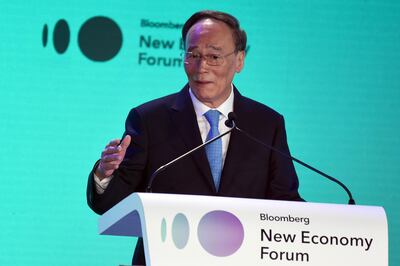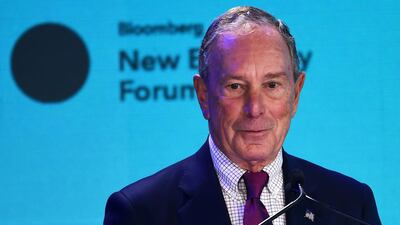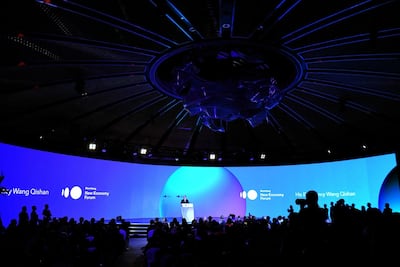- Michael Bloomberg opens New Economy Forum in Singapore
- US-China trade talk dominates meeting
- Dr Sultan Al Jaber talks about energy and population growth
- All blog timings UAE (UTC+4)
_________________
13.35pm
Big Debate: Has Globalisation Gone Too Far?
Spirited discussions ensued as two teams debated whether a populist backlash against trade and open borders should be reined in.
Speaking for the motion were Diana Choyleva, chief economist, Enodo Economics, and Stephen King, senior economic adviser, HSBC, while those against were Parag Khanna, managing partner, FutureMap and Nandan Nilekani, co-founder and chairman, Infosys Ltd.
_________________
12.24pm
Energy Challenges in the New Economies panel
UAE Minister of State and ADNOC CEO Sultan Al Jaber talked about population growth and the related demand for energy and downstream products.
He was optimistic about the market situation, seeing unprecedented growth in India, Japan, China, South Korea and Indonesia, and saw the "perfect sense" of introducing alternative energy sources.
The minister joined a panel which included Dangote Industries' Aliko Dangote, Josephine Wapakabulo, the CEO of Uganda National Oil Company, and ExxonMobil chairman Darren W Woods.
_________________
10.30am
Early analysis
The National's Editor in Chief Mina Al-Oraibi and Assistant Editor in Chief Mustafa Alrawi are in Singapore and they gave us their views on what's happened so far.
_________________
09:48am
Managing the Supply Chain Threat panel
HSBC's John Flint said the world is going through a period of reflection on deeper integration between countries.
He was talking alongside Mike Roman of 3M and Marjorie Yang, chair of Esquel Group, adding that he thought globalisation was around "80 per cent good" for the world.
"China will be the biggest economy in the not-too-distant future," he added.
Yang said the challenges for China when it came to boosting domestic consumption were the waste that invariably accompanies such a move.
She also mentioned how trade wars offered an opportunity to revamp operations, saying: "With this trade war, everyone is scared - that's good."
Roman talked about the impact of robotics, 3D printing and other "disruptive" issues, saying: "Those technologies are enabling us to do things we couldn't do before."
He also said there was much more room to invest in China.
_________________
09:20am
A Malaysian viewpoint
Malaysia's prime minister in waiting Anwar Ibrahim talked about the country's new outlook, saying his own premiership will differ from predecessor Mahathir bin Mohamad in that he will "smile more".
When asked what he did in prison - he was incarcerated for a five-year term in 2015 but was released earlier this year - Mr Ibrahim said he slept, sang, jogged, and studied hundreds of books.
His advice to anyone not having enough time to read was that they should go to jail.
_________________
08:30am
A World of Uncertainty panel
Chinese trade, relations with Beijing and a potential trade war with the US are the hot topics on the panel, featuring former Australian Prime Minister Kevin Rudd, India's foreign secretary S Jairshankar and Japan's Yoriko Kawaguchi.
_________________
08:20am
Recap: China sees no winners in trade war with US
China is ready to hold discussions and work with the United States to resolve trade disputes because the world's two largest economies stand to lose from confrontation, Vice President Wang Qishan told the New Economy Forum on Tuesday.
"Both China and the US would love to see greater trade and economic cooperation," Mr Wang said in Singapore.
"The Chinese side is ready to have discussions with the US on issues of mutual concern and work for a solution on trade acceptable to both sides," he said.
"The world today faces many major problems that require close cooperation between China and the United States. "t is our firm belief that China and the US will both gain from cooperation and lose from confrontation."
The focus is now on President Donald Trump's meeting with Chinese President Xi Jinping at the end of the month. Mr Trump has threatened to impose further tariffs on $267 billion of Chinese imports into the United States if the two countries cannot reach a deal on trade.
_________________
08:00am
Former Fed chair Janet Yellen on US employment
Keeping the US economy near full employment is lifting pay for unskilled workers and helping ease inequality in the country, former Federal Reserve Chair Janet Yellen said.
She cited examples such as unemployment for black Americans declining since peaking in 2010 and companies investing in training workers as hiring becomes more difficult.
It’s important to see the benefits that an economy operating at full employment confers to low-wage workers who are typically the most vulnerable, Ms Yellen said.
Most of the discontent with capitalism in the US stems from inequality and the stagnation of wages, which dates back to the 1980s and can be traced broadly to automation and globalisation, she told the New Economy Forum
_________________
07:20am
Henry Kissinger: US can't solve problems in short term
Henry Kissinger, the former US secretary of state during the Cold War era, said the challenge of avoiding a trade war between the United States and China is for both parties to outline their objectives clearer and where Washington and Beijing draws the line.
Mr Kissinger also noted in his optimistic address to the New Economy Forum in Singapore that disagreements are inevitable, but both sides must understand the risks of conflict.
He also noted that the US can't always solve problems in short-term.
_________________
07:00am
A view of the proceedings in Singapore
_________________
05:30am
Wang Qishan: China will have a healthier, more balanced future

The Chinese Vice President Wang Qishan told the New Economy Forum in Singapore on Tuesday morning that the country has moved from a high speed phase of economic growth to "quality growth".
He said that China will have a healthier, more balanced future but also warned that the challenge will be that its population still expect similar levels of benefits as they experienced during its fastest period of growth.
China's economy expanded in the third quarter at its slowest pace since the financial crisis with a rate of growth of 6.5 per cent. Since the 1990s it has experienced periods of phenomenal growth - at over 12 per cent at times - driving a sea-change in the country and creating a new middle class that has propelled Chinese consumption of goods and commodities.
________________
Read more
US-China trade war forces IMF to cut global economic forecast for first time since July 2016
________________
In Singapore on Tuesday, Mr Wang also said China’s foreign policy will be determined by internal interests with the world at a new historical crossroads over the challenge of sustaining economic growth.
China rejects any power politics or "cold war mentality" and "will remain open and let the markets work their magic," he said.
He said that anger is not the correct response to resolve any issues arising from inequality stemming from economic globalization, which is "not a zero sum game".
Economic globalisation should be protected and there should also be a respect of the rules based system as represented by the WTO, Mr Wang said.
_________________
05:00am
Wang Qishan addresses the NEF
China's Vice President Wang Qishan said on Tuesday that the world's second largest economy is ready to talk with the United States to resolve their growing conflict over trade.
Speaking at the New Economy Forum, hosted by Michael Bloomberg in Singapore, Mr Wang delivered a message of co-operation, the need to build consensus and provided a vision of China helping to ensure that economic growth can be inclusive for all.
Amid what has been a steady rise in tensions between his country and the US on trade with both firing protectionist volleys at the other, Mr Wang signaled that Beijing is willing to settle any issues with talks.
There has been some speculation that a G20 meeting in Argentina later this month could be the scene for presidents Donald Trump and Xi Jinping to hammer out a deal on trade.
Mr Wang said in Singapore that China and the US need to co-operate closely to tackle world’s problems. Both sides will lose from confrontation, he said.
In the last few months hundreds of billions of dollars worth of goods from the US and China have been hit with trade tariffs.
_________________
4.30am
Michael Bloomberg opens the NEF
Michael Bloomberg gives special mention to Hank Paulson and Henry Kissinger for their friendship, advice and for shaping the world. He thanks the conference's hosts, the Singapore government. The world is not remarked for its peace and tranquillity, he says, but bringing public and private sectors together to help with that is what this event is about. And Singapore is the ideal venue for this aim.
Let’s tackle challenges together, comes the inclusive message from the former mayor of New York. We must do more to make sure benefits of economic growth spreads far and wide, he says. Do more on climate change. Private sector has lead role if we are to make progress. This forum will spur collaboration.
“If you’re talking, you’re not fighting”. Action is better. Mr Bloomberg says that 20 solutions will come out of #NewEconForum to ensure inclusive economic growth and this is just the beginning. He introduces China’s Vice President Wang Qishan whom he has known for two decades. They were mayors of New York and Beijing respectively.
_______________
Business and political leaders descend on Singapore
The New Economy Forum, hosted by Michael Bloomberg, has drawn business, political and thought leaders from around the globe to Singapore to tackle the most significant opportunities and challenges that are facing the next generation including how to remake global trade, China-US ties, and the impact AI will have on the world order.
Mr Bloomberg is joined at the event by 400 delegates including high-level attendees such as:
- Dr Sultan Al Jaber, UAE Minister of State and CEO of Adnoc
- Henry Kissinger, former US Secretary of State
- Janet Yellen, former Federal Reserve chairwoman
- Anwar Ibrahim, Malaysia's prime minister in-waiting
- John Flint, HSBC chief executive
- Yana Peel, the CEO of Serpentine Galleries
Wang Qishan, Vice President of the People’s Republic of China, has been announced as a keynote speaker.
Visit the NEF website for the full agenda.
The National's team, led by Editor in Chief, Mina Al-Oraibi, is covering the highlights of the two-day conference.
_________________
UAE can play 'critical' role to solving the world’s most challenging crises
Bloomberg's Justin B Smith says today's New Economy Forum is a new community for a new economy and the UAE can play a critical role.
Speaking to Mustafa Alrawi at a business luncheon on Monday, the chief executive of Bloomberg Media, said Economic and demographic growth advantages mean that together – China and India, South East Asia, the Middle East, Africa and Latin America are “really going to be the centre of the future of the growth of the global economy".
The UAE delegation includes business leaders from Abu Dhabi and Dubai. It is being led by Minister of State Dr Sultan Al Jaber, who is also chief executive of the Abu Dhabi National Oil Company. Adnoc has signed a number of deals with Chinese companies this year including for downstream investment and a landmark seismic onshore and offshore survey when China's President Xi Jinping visited the UAE in July.
_________________
Listen to our Business Extra Podcast
Host Mustafa Alrawi and Chris Nelson discuss the UAE and the Gulf's economic outlook
_________________
Read more
UAE non-oil private sector growth eases in October but new business up
EFG Hermes steps up coverage of frontier markets in Africa and Asia


